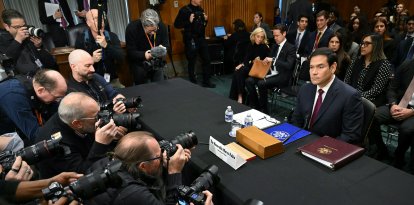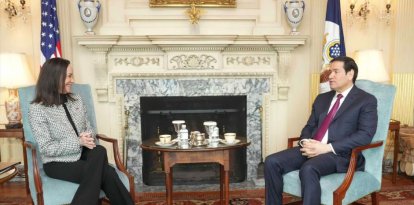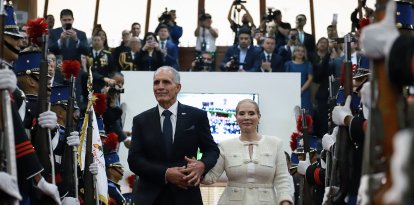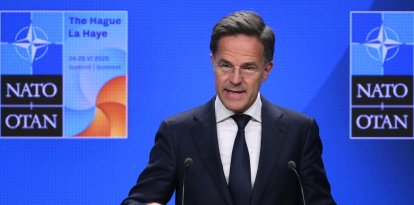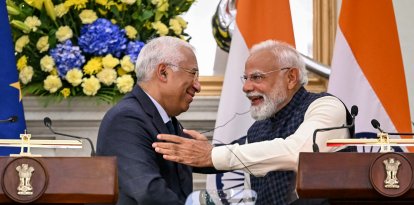Viable proposal or utopian idea? Everything you need to know about the dollarization proposed by Javier Milei in Argentina
Erroneously, many have called the libertarian's proposal absurd. But in reality, many reasons make it a viable and sensible option that does not necessarily imply that an economic miracle will occur.

(Cordon Press)
This November 19, the libertarian economist Javier Milei, one of the most important political phenomena in the entire region in recent years, will be measured against the official candidate, Sergio Massa, to elect the next president of Argentina. A country rich in resources that is going through a severe economic and social crisis as a result of mismanagement in recent decades.
Milei emerged as a reaction to traditional politics and has gone viral in the United States for his energetic clips where he attacks the left of his country (Kirchnerism, progressive Peronism and other aspects). He promises a massive reduction of the State to control a notable fiscal deficit and has several proposals that divide public opinion in Argentina. The most important, without a doubt, is the dollarization of the country in the face of the resounding fall of the national currency, the Argentine peso, whose value fluctuates and depends greatly on the chosen exchange rate.
At the time of publishing, the value of the so-called "blue dollar," which is not the official rate but the most accurate value because the dollar is used daily for trading, is above 900 pesos.
Milei's dollarization proposal is very controversial, even among opinion leaders, economists, and ordinary Argentines. First, because it is a proposal requiring a complex explanation; second, because there is a lot of misinformation about what dollarization does or does not imply; and third, there is no consensus on the viability of dollarizing Argentina.
For this reason, Voz Media spoke with various experts, including ideologues of dollarization, to explain what an eventual victory for Milei would mean and what Argentines could expect if this economic policy is implemented.
What does it mean to dollarize a country?
As Santiago Casas, a member of renowned economist Emilio Ocampo's work team and one of the ideologues of dollarization in Argentina whom Javier Milei recruited during the presidential campaign, explained to Voz Media, dollarizing an economy implies recognizing the US dollar as currency legal tender.
"This can be done in many ways that do not necessarily involve eliminating the local currency. There is, for example, the case of El Salvador, which exemplifies the coexistence of the American currency with the local currency at a constant and permanent conversion rate," explained Casas.
"Other models have chosen to change the local currency entirely for dollars issued by the FED, for example, Ecuador. In any case, the local monetary authority loses the ability to carry out monetary policy," said the expert.
Nicolás Cachanosky, a renowned Argentine economist who worked on the dollarization proposal alongside Ocampo, spoke with Voz Media and expanded on the explanation of what dollarization is and the two main reasons why it should be dollarized.
"In the case of Argentina, dollarization would imply the adoption of the US dollar for two reasons. Firstly, the Argentine economy is already informally dollarized. Argentines save in dollars, and increasingly more transactions are denominated and made in dollars. The second reason is to eliminate the exchange mismatch of the treasury, which collects taxes in pesos but must pay a large external debt in dollars," said Cachanosky.
Viability of dollarization: A dream or tangible proposal?
To understand the feasibility of a monetary policy of this caliber, it is necessary to understand that there are several assessments: one is the economic-financial one, and the other is the political one.
On the economic side, both Cachanosky and Casas agree that a dollarization process in Argentina is feasible, even contradicting critics who say that a measure of this style is impossible due to the lack of dollars in the South American country.
Of course, economists emphasize that dollarization is viable as long as there is a president in the Casa Rosada willing to make structural changes and necessary reforms so that dollarization, which is not a magic formula to solve Argentina's financial problems, comes to fruition.
"Dollarization in Argentina is possible. But this requires clearing up at least two questions. The first is that to launch dollarization, fewer dollars are needed than critics maintain," Cachanosky said.
"The second clarification is that dollarization, although it does not require ideal conditions, can hardly be achieved by the current government of Alberto Fernández. It is important to distinguish the discussion of how to dollarize from the problem of when to dollarize. Perhaps there are at least two relative prices that must be corrected before or, at most, on par with dollarization. The official exchange rate and public service rates. However, it is important to remember that these two relative prices must be corrected regardless of whether it is dollarized or not. In fact, dollarization can make mitigating the cost of these two corrections easier."
For his part, Casas remarked: "The proposal developed by Emilio Ocampo and Nicolás Cachanosky demonstrates that it is possible to carry out dollarization, even with the existing conditions and without needing an exchange rate above the current free market rate. Clearly, prior reforms will have to be carried out, more than anything reorganization of the banking system."
However, these answers raise another question: although dollarization is feasible, what other reforms must be carried out for it to be successful?

Dollarization, Milei, Argentina
One of them is the reduction of Argentina's staggering fiscal deficit, which skyrocketed, according to January records, by a year-on-year increase of 1,121%.
Sergio Massa, the presidential candidate appointed months ago as economy minister, promised that one of his priorities was to reduce the deficit, but during his administration, he increased public spending. A measure that goes against his supposed objective of reducing said deficit.
Therefore, in a country like Argentina, the viability of the success of a dollarization proposal largely depends on Milei's ability to eventually reduce the fiscal deficit through complex reforms that involve, for example, the massive reduction of the State.
"Fiscal policy is not linked to monetary policy"
Martin Litwak, an Argentine lawyer who is an expert in estate planning and tax issues, spoke with Voz Media and explained the viability of the corrective measures that Milei must apply if he reaches the Casa Rosada to save the economic future of Argentina.
"First, it is important to clarify that the fiscal issue, in principle, is not necessarily tied to monetary policy. In other words, there are countries with their own currency and high taxes (such as Sweden or Norway), countries with their own currency and low taxes (Switzerland), countries without their own currency and high taxes (Ecuador) and countries without their own currency and low taxes (BVI)," Litwak explained. "This being the case, whether you continue using pesos or switch to using dollars, euros or yuan, what you should not do is spend more than you have or charge people taxes to finance expenses that are not essential for a State to survive."
That is, whether or not Argentina's economic success depends largely on the political ability of the potential Milei Administration to carry out structural reforms. With this, he highlights the point explained by previous economists, "dollarization is not a magic recipe," but rather a monetary policy that, according to Milei's proposal, could correct in two years the inflationary phenomenon that is eating away at the savings of Argentines day by day, but that does not guarantee economic success either.
"Dollarization usually serves as a stabilization measure for an economy in crisis in the short term, but it does not usually solve long-term problems. If we are prepared to accept that Argentina is a peripheral country that will never again be among the richest in the world, then perhaps it is a good option. Otherwise, inflation would have to be resolved in another way," Litwak told Voz Media.
"As an example," the lawyer continued, "Ecuador, several years after dollarization that at the time involved a great loss for many of its savers, continues to have a very high country risk, has doubled public spending, has a very closed economy and is not precisely characterized by its political stability and legal security. Regarding country risk, of the four Latin American countries that have the highest risk, there are two that are dollarized (the aforementioned Ecuador and El Salvador), one that is dollarized in fact (Venezuela) and another without currency (Argentina)."
That is to say, for Litwak, dollarization is far from being an economic and financial solution for Argentina. What is imperative and mandatory to try to save the economy of the South American country are the reforms of the State and the cutting of public spending in a country full of expensive social plans and a State extremely present in the daily life of its citizens.
"More than feasible, the reduction of public spending in Argentina is necessary, essential, it must be the only possible alternative. In fact, it is, even if some don't want to see it," Litwak said. "Argentina needs to lower public spending and reduce taxes. Transfer money from the State to the people. Or, rather, stop moving it in the opposite direction. Let citizens spend on what they want, not the State on what it believes people need. Reducing the fiscal effort made by all Argentines has to be the first issue on the candidates' agenda."
The lawyer explained that excessive taxes turned Argentina into an unstoppable fiscal hell that only served to sustain excessive, unsustainable and unnecessary public spending.
"I never tire of saying it: the State should spend the minimum necessary to function, no more than that. But this is unthinkable in a country with the fiscal voracity that Argentina has developed over time," he said.
Why not save the peso instead of dollarizing it?
So, if dollarization is not a magic formula and reforms are necessary for Argentina's economic future, why, then, should we not try to rescue the value of the Argentine peso instead of adopting a foreign currency with all that it implies (reorganization of the banking system, obtaining foreign currency, liquefying the currency, among other issues)?
For Cachanosky, this question is answered from the point of view of trust. The Argentine peso, today, is a currency that not even Argentines themselves use to save or, in many cases, trade because the citizens themselves do not have confidence in the institutions that issue the peso or in the political leaders that govern the country in a bad way decades ago.
In fact, given the instability and the uncertainty about who will win the elections, many merchants in Argentina have stopped supplying their clients due to the lack of certainty about what the prices of their products will be like to replenish their stocks.
"One issue with fiduciary currencies is that their success depends largely on the institutional credibility of their issuer, the central bank, and the political leadership. Unlike commodity money, such as gold, fiduciary money has no intrinsic value. Therefore, without a strong base of institutional and political credibility, it is very difficult to save the peso," said Cachanosky, who explained that adopting a foreign currency is not a permanent state of monetary policy.
"Argentina is more likely to have its own currency again after dollarizing than without dollarizing. Dollarization does not have to be an arrival point, it may well be the necessary intermediate step to be able to implement another monetary regime that is not possible under current economic and institutional conditions," stated the renowned economist.
In that vein, Casas explained that the death of the Argentine peso in the face of the adoption of the dollar is an almost inevitable situation because the Argentine himself has decided to opt for the American currency to save, in a kind of de facto dollarization that is a political phenomenon seen in other countries with inflationary crises like Venezuela.
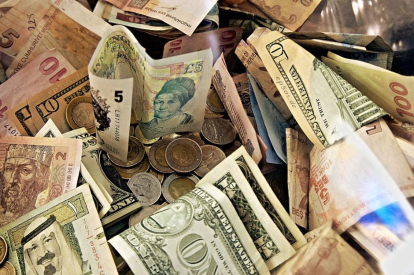
Dollarization proposed by Milei
"Let's start from the basis that Argentines are already de facto dollarized because they voluntarily save in dollars in their private lives and only use the peso (less and less) as a transactional mechanism. For Argentines to believe in the peso again, decades of low inflation and care for the currency would be necessary because trust is something that is lost quickly and is almost impossible to recover. Furthermore, with the existing fiscal and monetary problems, it is very difficult to think that this path of stability can occur with the peso," Casas told Voz Media, emphasizing, "dollarization will not save Argentina, but it could eliminate inflation and cut off the loss of purchasing power of workers. For this measure to be successful, it must be accompanied by many other measures that make it credible and permanent."
Can Milei dollarize?
Understanding the viability of Milei's proposal and its reasons, there is only one last question to clarify: Can the libertarian candidate bring his plan to reality?
Argentina, whoever wins on November 19, will have a major governance problem, and this is where Milei's political ability to generate consensus and carry out his most important proposals is questioned.
However, with the support of the most liberal wing of Together for Change, led by Patricia Bullrich and former president Mauricio Macri, the libertarian candidate, at least, ensures strong support from part of the most critical bench in Congress. Even so, the governance situation hangs by a thread and needs some "opportunistic politician like there always are," explained Litwak, who warned that the economist "is going to face an unprecedented political situation starting December 10."
That's why Milei's plan is so challenging. Not only is the viability of his proposal complex from an economic point of view but also because he has to fight in the political field in a country where intense polarization prevails. He will surely find strong opposition to his main reforms from all sectors of the Argentine left, the unions and a good part of society that is unconvinced about its policies.

















